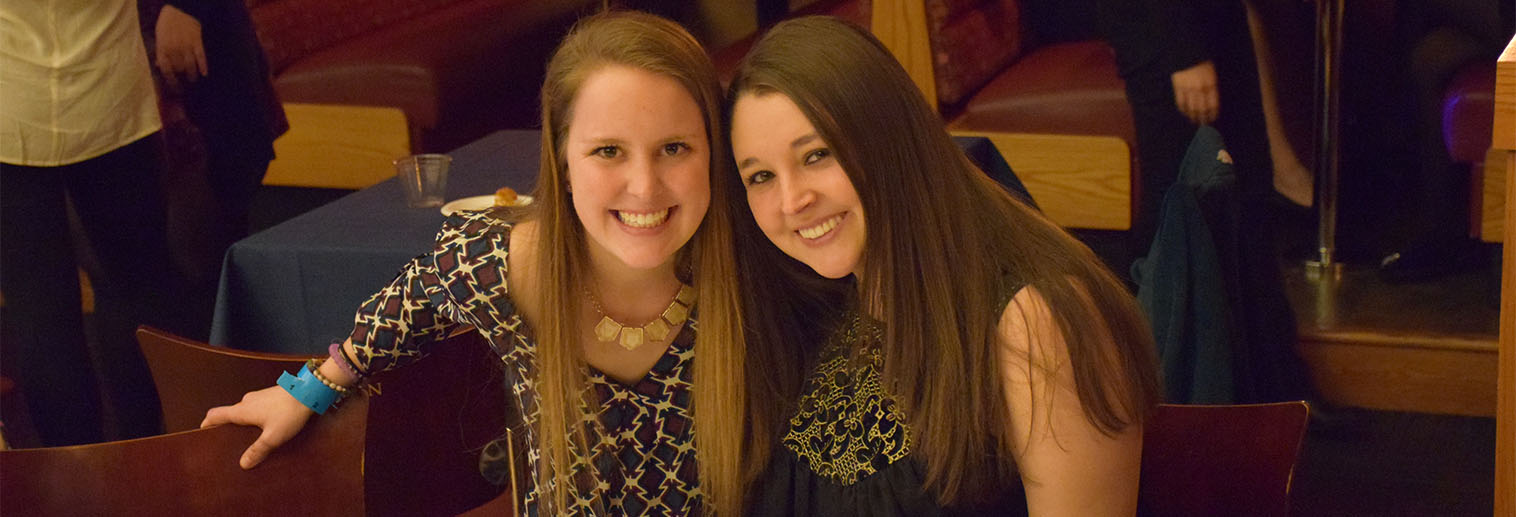Serious Fun!
When asked what she does for fun, Rebecca Eisenstein ’16 smiles big and her eyes go wide. “All of this is fun!” she replies with a little laugh sprung not from humor but pure joy.
“This” means her past presidency in United Student Government (USG), two years as an orientation leader, volunteering for Habitat for Humanity, representing the University as a 26-points ambassador, and fulfilling her current role as treasurer of Omicron Delta Kappa, (ODK) the national leadership honor society (“Being on the board of ODK is really cool because I get to work with other leaders on campus,” says Eisenstein.)
“This” means building meaningful relationships with Moravian University faculty, staff, and administration.
“This” means discovering Rebecca Eisenstein and becoming that woman.
And discovering Rebecca Eisenstein is a real treat for this reporter who sits talking with her across the corner of a long rectangular table in the Snyder room, while in the peripheral vision of her mind’s eye a list of adjectives scrolls: animated, quick, bright, playful, passionate, energetic, insightful, open-minded, and hungry--for challenge and opportunity.
Eisenstein came to Moravian University interested in journalism, but courses with Professors Desiderio and Kaskowitz lured her to business, and she declared an interdepartmental major in marketing and graphic design, the latter to differentiate herself--to become a one-stop shop for all marketing needs: ideas, words, and visuals. Then in February of her junior year, Eisenstein had a realization.
Sitting in Prosser Auditorium for a presentation by author and career expert Donald Asher, she took hold of a rope of advice: Identify the job you want and where you want it, find the person doing it, and ask that person how he or she got there. “The next day in my weekly meeting with Dean Loyd—I was USG president at the time—I walked in, sat down, and said, ‘So I want to be you,’
“That moment in Prosser, facing the question what do you want to do with your life, I realized all the opportunities that had come my way at Moravian University—the experiences and the challenges—had been shaping me into this person who understands how to work with people, specifically how to work with and for students, and I realized I never wanted to stop doing this.”
Here, Eisenstein shares the perspectives formed through those experiences and challenges during these past four years.
On Service
My passion is service—in the broadest sense. Nonprofits are what come to mind, but service is so much more than that. It’s serving groups and individuals, doing a kind act, even making a decision with someone else’s best interest in mind.
On Leadership
I used to be a micromanager, but my leadership experiences have shaped me into a person with vision who can walk into a room and say, ‘okay, let’s get a mission statement that we can work toward.’ The before me would never have done that. I would have said, ‘Here’s my goal; let’s do it,’ but that’s not leadership; it’s not service. The heart of leadership and service is to ask, what are our goals and what do we hope to accomplish from those goals that will serve a larger community?
On Reflection and Gratitude
Reflection has played a key role in my transformation as a leader. I have to give Dr. D a shout-out for that. During the summer between my junior and senior year, I made a point to take 5 to 10 minutes after work every day to reflect on what went well, what didn’t, what I could do better, how I should prioritize the next day’s activities, and that reflection piece has been very important to my growth and success.
And since taking a happiness class this semester with Naomi Gal, I began keeping a gratitude journal. I don’t usually buy into that stuff, but I’ve really embraced it, and I wish I’d been doing it my entire life. It takes just two minutes. Write down even just one thing that you are grateful for, especially on days when it seems nothing good has happened because that’s when it makes the most difference. When you can pull out one positive thing or put a positive spin on something that you’ve been focusing on as a negative, it’s amazing. It’s about finding the positive in the negative.
Keeping a gratitude journal has changed my life. It’s helped me not go to bed angry when I’ve been really upset about a situation, and boosted my positive outlook. I’m a nondenominational Christian, and this practice helps me see God working in my life in ways that I didn’t before or wouldn’t have noticed.
On Personal Accomplishment
As a member of the Pillar III team, I contributed to the concept for the MoPaw and designed the graphic. I also brought forward the idea of stoles of gratitude. It’s a way to say thank you to anyone—a person or persons, parents, grandparents, mentors, significant others—who helped you through your years here at the college. You wear the stole during the graduation ceremony and afterward place it on the person you are honoring. It’s a visible gesture of gratitude.
Engendering a culture of being thankful and recognizing others for their positive actions and influence—I contributed to that. It’s been my greatest accomplishment over these past four years and I feel proud to have made a difference.
On Making the Most of Moravian
My advice to underclassmen: Realize how short your time is here and that these four years are some of the most important in your life. Take advantage of the many opportunities that Moravian provides. This college is really unique and really special. The people here—even those who don’t know you--want nothing more than for you to succeed. So, take five minutes to go meet the provost. When you see President Grigsby in the lounge, stop and introduce yourself. Make connections with administration, staff, and faculty because they will last long after you leave here.
And remember that Moravian is home.

